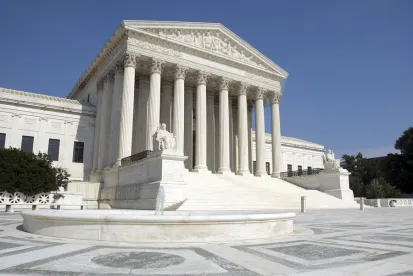In recent years, the Federal Trade Commission (FTC) has with increasing frequency sued in federal court under the purported authority of Section 13(b) of the Federal Trade Commission Act1 (FTC Act) to obtain restitution of losses or disgorgement of profits resulting from “unfair methods of competition” or “unfair or deceptive acts or practices.” In doing so, the FTC has circumvented often time-consuming FTC administrative hearings that can produce nothing more than a cease-and-desist order. The FTC has followed this procedure in pursuit of both its consumer protection mission and its antitrust enforcement mission. On 22 April 2021, the U.S. Supreme Court in AMG Capital Management, LLC v. FTC2 unanimously held that Section 13(b) does not grant the FTC authority to obtain restitution or disgorgement in federal court without a prior administrative cease-and-desist order. Even before the Supreme Court’s decision, the FTC commissioners had unanimously asked Congress to amend the FTC Act to put to rest questions regarding its power to obtain such relief through the federal courts without resorting to the administrative cease-and-desist procedure.3
Although Section 19 of the FTC Act empowers federal courts to award restitution to consumers after the FTC has entered a cease-and-desist order against some deceptive acts or practices, Section 19 generally does not provide such a remedy in support of the FTC’s antitrust mission against “unfair methods of competition,” since relief under Section 19 requires an “unfair or deceptive at or practice” that “a reasonable man would have known . . .was dishonest or fraudulent.”4
THE CASE BELOW
The district court found that the respondents in AMG Capital Management (Defendants) operated several companies that made payday loans to consumers. Further, it found that the Defendants misled borrowers in the description of the automatic renewal provisions of the loan agreements, the repayment terms, and the finance charges. Forgoing the option of instituting an administrative cease-and-desist action against Defendants’ allegedly deceptive acts and practices, the FTC sued them in federal district court. Purporting to rely upon its authority under Section 13(b), the FTC requested not only an injunction restraining the challenged conduct, but also restitution to the borrowers and disgorgement of the Defendants’ profits. The district court enjoined Defendants from engaging in the consumer loan business and directed them to pay US$1.27 billion in restitution and disgorgement.5 On appeal, the Ninth Circuit affirmed the FTC’s statutory authority to obtain such relief on the basis of prior Ninth Circuit precedents6 interpreting Section 13(b). However, two of the three judges concurred specially, questioning the correctness of those precedents.7
BACKGROUND
Section 5 of the FTC Act, which pre-dated Section 13(b), authorizes the FTC to file an administrative complaint against any party the FTC has “reason to believe . . . has been or is using an unfair method of competition or unfair or deceptive act or practice.”8 An administrative law judge within the FTC conducts a hearing on the charges and prepares a report of findings of fact and conclusions of law. If appropriate, the administrative law judge orders the respondent to cease and desist the challenged conduct. Such an order is then reviewable by the commissioners of the FTC and then by a federal court of appeals.
Section 13(b), added to the FTC Act in 1973, authorizes the FTC to obtain from a district court a temporary restraining order or a preliminary injunction to restrain the use of an unfair method of competition or an unfair or deceptive practice while the administrative hearing is pending. Further, it empowers the FTC “in proper cases” to obtain from the court a “permanent injunction.”
In its 1973 revisions to the FTC Act, Congress also added Section 5(l),9 which allows a district court to award civil penalties against persons who violate a final FTC cease-and-desist order. Section 5(l) also authorizes courts to enter “mandatory injunctions and such other and further equitable relief as they deem appropriate in the enforcement of such final orders of the Commission.” Two years later Congress further added Section 19 to the FTC Act, authorizing district courts to remedy an “unfair or deceptive act or practice” as to which a cease-and-desist order has been entered by granting “such relief as the court finds necessary to redress injury to consumers, or other persons,” provided that “a reasonable man would have known [the act or practice] was dishonest or fraudulent.” Specifically authorized by the section are “the refund of money,” the rescission or reformation of contracts, and the payment of damages.10
In the late 1980s, the FTC began to use Section 13(b)’s “permanent injunction” powers to bring district court actions for consumer refunds and disgorgement of profits received through deceptive acts and practices without first obtaining a cease-and-desist order.11 In the 1990s, the FTC invoked this same section to pursue federal court orders awarding restitution or disgorgement for “unfair methods of competition” without first pursuing a cease-and-desist order.12
THE SUPREME COURT DECISION
In its unanimous opinion in AMG Capital Management, the Supreme Court emphasized that the question before it was not whether the FTC’s ability to obtain monetary relief for consumer protection and antitrust violations without pursuing lengthy cease-and-desist order process would be beneficial from a policy perspective, but only whether Congress had authorized use of that procedure. The Supreme Court concluded that the legislation did not grant such authority. First, the Supreme Court reasoned that Section 13(b) expressly refers only to obtaining preliminary or permanent “injunctions,” not to other forms of equitable relief. Such injunctions, the Supreme Court observed, are aimed at preventing ongoing or future harm, not retrospective relief. Further, the Supreme Court considered the language of Section 13(b) as a whole to be focused “upon relief that is prospective, not retrospective.” Additionally, the Supreme Court saw Section 19’s detailed structure for awarding conditional monetary relief from deceptive practices after the entry of a cease-and-desist order to be inconsistent with an interpretation of Section 13(b) that would authorize such monetary remedies against a broader class of respondents without first obtaining a cease-and-desist order. A limited reading of the FTC’s “injunction” powers under Section 13(b), the Supreme Court said, “produces a coherent enforcement scheme.”
CONCLUSION
In recent years the FTC has placed increasingly greater reliance on an expansive interpretation of its powers under Section 13(b) in order to obtain compensation for victims of unfair competition or deceptive conduct, and it has obtained substantial amounts in both restitution and disgorgement. After courts began to entertain more-limited interpretations of the FTC’s Section 13(b) powers,13 the commissioners from both political parties, as noted above, sought to have Congress shore up those powers. New legislation restoring the FTC’s power to obtain restitution and disgorgement has widespread political support. Whether such a limited change will become enmeshed with broader antitrust revisions, however, is a different question.
1 15 U.S.C. § 53(b).
2 ____ U.S. ____, 2021 WL 156607 (Apr.22, 2021).
3 Prepared Statement of the Federal Trade Commission: Strengthening the Federal Trade Commission’s Authority To Protect Consumers, Before the Senate Committee on Commerce, Science, and Transportation (Apr. 20, 2021), https://www.ftc.gov/system/files/documents/public_statements/1589164/prepared_statement_of_the_ftc_before_the_senate_committee_on_commerce_science_and_transportation.pdf; Prepared Statement of the Federal Trade Commission Before the Senate Committee on Commerce, Science, and Transportation (Aug. 5, 2020), https://www.ftc.gov/system/files/documents/public_statements/1578963/p180101testimonyftcoversight20200805.pdf.
4 15 U.S.C. § 57b; see F.T.C. v. Figgie Int’l, Inc., 994 F.2d 595 (9th Cir. 1993).
5 2016 WL 5791416 (D. Nev. Sept. 30, 2016).
6 See FTC v. Com. Planet, Inc., 815 F.3d 593, 598 (8th Cir. 2016); FTC v. Pantron I Corp., 33 F.3d 1088, 1102 (9th Cir. 1994); FTC v. H.N. Singer, Inc., 668 F.2d 1107, 1113 (9th Cir. 1982).
7 910 F.3d 417 (9th Circuit 2018).
8 15 U.S.C. § 45.
9 Id. § 45(l).
10 Id. § 57b.
11 See H.N. Singer Inc., 668 F.2d 1107.
12 See FTC v. Mylan Labs, No. 98-3114 (D. D.C.); FTC v. The Hearst Tr., No. 06-734 (D. D.C.)
13 See, e.g., FTC v. Credit Bureau Ctr., LLC, 937 F.3d 764 (7th Cir. 2019); FTC v. AbbVie Inc., 976 F.3d 327 (3rd Cir. 2020).




 />i
/>i

